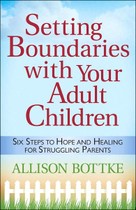It’s Time to Change How You Interact with Your Adult Child
- Allison Bottke Author, Setting Boundaries with Your Adult Children
- Updated Jun 28, 2011

Editor's Note: This article is sixth in a 6-part series on how parents can stop enabling unhealthy behaviors in their adult children. See links at the end of this article for other articles in this series.
We enabling parents live either smack-dab in the middle of crisis, or we're simply in between crises, waiting for the other shoe to drop. Every time the phone rings at night we are catapulted to a place of despair. Will it be our adult child in a drunken stupor, the police…or the morgue?
Let's look at these two ways we live and what we need to do to implement the decision we've made to stop enabling and to set boundaries for our adult child.
1. In between crises: Without a doubt, this is the best time to put our decision into motion. We would be wise to develop our action plan during this time, then present it to our adult child, and get out of the way.
2. In crisis mode: This is a harder time to implement our decision, but it can also show an immediate effect. If, for instance, the adult child has been arrested, do we intervene, or not? If the adult child lives at home and is involved in anything related to drugs, alcohol, crime, violence, unacceptable behavior, or any type of illegal activity whatsoever, do we insist on his immediate departure from your home? Do we call the authorities if necessary? He can choose to go to rehab or to a friend's home, or anywhere he'd like—including living on the street, whatever he decides…but it is not your responsibility to find somewhere for him to go.
It takes determination, hard work, and commitment to stop playing our adult child's game. And, of course, it takes a great deal of effort on the part of our adult children to change. But it's up to them to make the choice. Either they will do what it takes, or they won't.
Remember, the goal is not to try to fix them, but to fix ourselves. You don't want to repeat a response or behavior that hasn't worked before. It's time to do something different. In order to get smart and take action, we must be ready to declare the following:
As of today I will no longer be:
· An enabler to someone who has no self-respect or respect for me
· A rescuer to someone who has no desire to be rescued
· A caregiver to someone who is capable of caring for himself
That means it's time to develop the plan that will enable us to implement these crucial steps. We must come to the table as cool, calm, and collected adults with a well-developed written plan that clearly indicates our goals. Above all, we must speak this new plan in love and not in heated anger or frustration.
First, remember that you are bringing your plan to the judgment table, not to the negotiating table. The document you and your spouse (if applicable) are going to develop is not open for discussion or negotiation. You are the adult and this is your home. It is your money, your livelihood, your future, and the time has come for you to define acceptable boundaries and to commit to them.
If you are too weak to do this alone, ask for help. Enlist the aid of an already established support group, reliable counselor, or professional interventionist, someone who is willing and able to stand in the gap for you, to be an accountability partner or to intervene as your mouthpiece if needed.
Your attitude is key. It will help if you can:
1. Realize that you can hate the situation and still love your adult child.
2. Have confidence that God will make a way where there seems to be no way.
3. Accept the truth that the time has come for drastic measures.
The next step is to pray—before and throughout the process. Then talk with your mate or counselor, and write your decisions so all involved can be clear on what they are. Don't make developing this action plan so elaborate that you never get it accomplished. Set a timeframe to get the plan developed, and do it. A detailed Action Plan Template is available in my book.
When you are ready to present your plan of action to your child, remember that you are setting him on a difficult course—and he won't be happy about it. But you must be strong. You should know by now from your own personal experience that difficulty in life is not always a bad thing. What your child perceives as difficult, you as the parent should see as the opening of a series of opportunities for your child to have some meaning in his life. Healing often comes through pain first. Physical therapy is painful, but it's always conducted for our own good. So, too, are God's plans always meant for our good—even when we can't understand them.
I've found that when it comes to consequences, we need to overcome four needs on our journey to establishing healthy boundaries with our adult children.
1. The need to overcome the often paralyzing fear of consequences
2. The need to accept that there will be consequences and be willing to live with them
3. The need to prepare for possible consequences—positive and negative
4. The need to focus on the consequences pertaining to our life, not just to the life of the adult child
Something to think about …
We may be hindering our adult children from living out their God-given destiny when we shelter them from the consequences of their actions. And yet, even knowing that, the mere thought of the negative consequences our adult children might experience sends many of us into a state of abject terror. Could it be that for some of our adult children this new journey toward independence might be phenomenally freeing? Perhaps the consequences won't be as bad as we think.
Deciding to parent differently, regardless of consequences, is a key ingredient in making the changes needed to stop our enabling behavior. It's never too late to parent differently—and it's never too late for our adult children to grow up and take responsibility for their lives.
Originally posted October 13, 2009.
If you're a hurting parent who dearly loves your adult child but longs to see him at last take responsibility for his life, please take a moment to watch the video "Mean What You Say and Say What You Mean" (Episode 12) and "Hey Dude, Where's My Car?" (Episode 10) on the audio/video page of our web site. It could save your sanity—and maybe even your adult child's life.
Adapted from Setting Boundaries with Your Adult Children, Six Steps to Hope and Healing by Allison Bottke © 2008. Harvest House Publishers. All rights reserved. Visit www.SettingBoundaries.com.




















